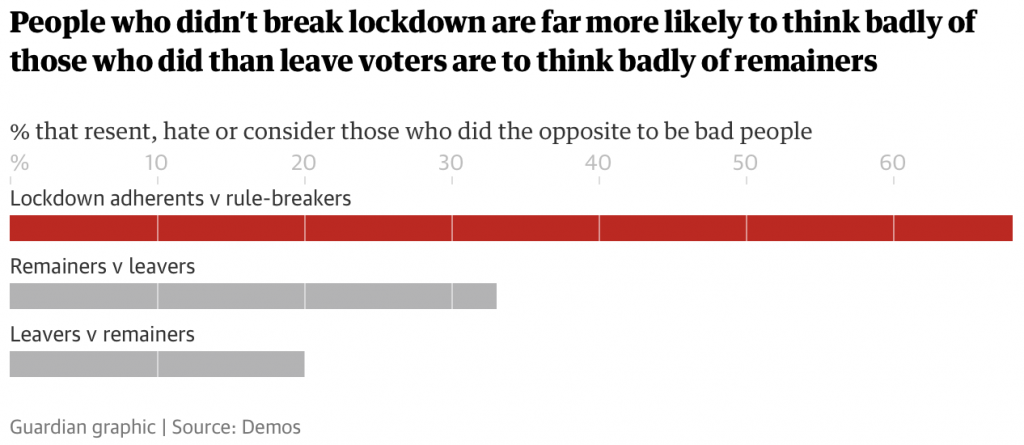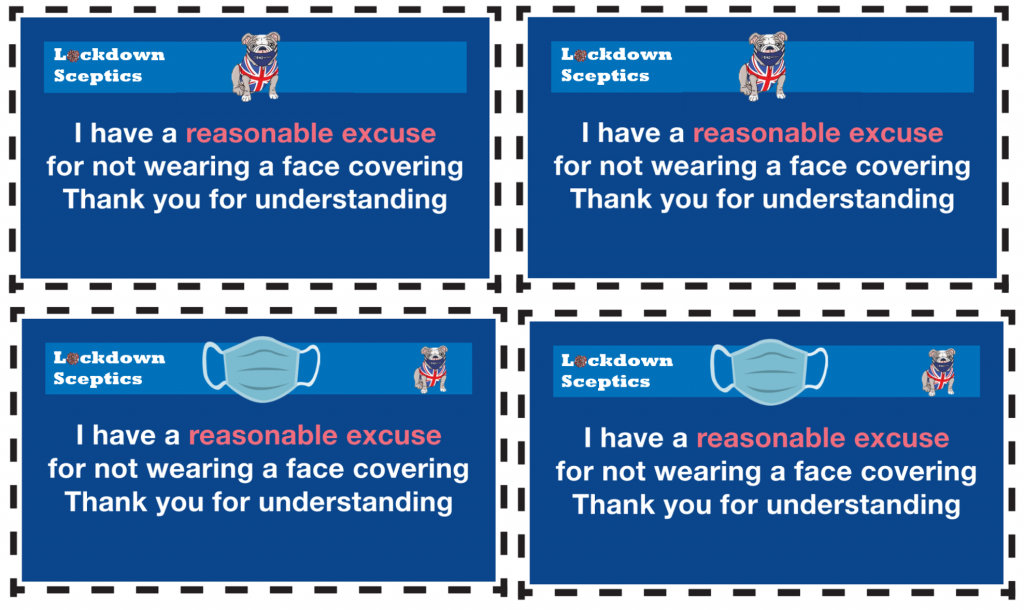A Ferguson Worth Listening To

James Ferguson, who runs a financial research company called the Macrostrategy Partnership, has produced a research paper on the FPR (False Positive Rate) of the PCR test in which he explains why the PCR test is a poor diagnostic tool when the prevalence of COVID-19 in the general population is so low. (The lower the prevalence, the more likely it is that a positive result is a false positive).
Here’s the opening section:
The UK has big problem with the false positive rate (FPR) of its COVID-19 tests. The authorities acknowledge no FPR, so positive test results are not corrected for false positives and that is a big problem.
The standard COVID-19 RT-PCR test results have a consistent positive rate of ≤ 2% which also appears to be the likely false positive rate (FPR), rendering the number of official ‘cases’ virtually meaningless. The likely low virus prevalence (~0.02%) is consistent with as few as 1% of the 6,100+ Brits now testing positive each week in the wider community (pillar 2) tests actually have the disease.
We are now asked to believe that a random, probably asymptomatic member of the public is 5x more likely to test ‘positive’ than someone tested in hospital, which seems preposterous given that ~40% of diagnosed infections originated in hospitals.
The high amplification of PCR tests requires them to be subject to black box software algorithms, which the numbers suggest are preset at a 2% positive rate. If so, we will never get ‘cases’ down until and unless we reduce, or better yet cease altogether, randomized testing. Instead the government plans to ramp them up to 10m a day at a cost of £100bn, equivalent to the entire NHS budget.
James has kindly given me permission to republish this research, usually only available to his paying clients. This is a masterly skewering of the current nonsense about cases rising “exponentially”, exposing the poor maths and misunderstood science underpinning the second wave hysteria. (For an example of this hysteria, read this article in today’s Sunday Times.) It makes a great companion piece to the paper by the three eminent scientists that Lockdown Sceptics published last Tuesday.
Very much worth reading in full.
It’s quite long, but it’s written in lucid prose and the maths is easy to follow if you have half a brain cell – which, apparently, Matt Hancock does not. You won’t read a better piece on this whole fiasco today.
Stop Press: My financial journalist friend has an interesting observation about the Prime Minister: “Boris reminds me of a hereditary king – Edward II or Henry VI – who is so staggeringly incompetent that he must be removed before doing too much damage. I felt the same way about May but Boris is worse. Your idea of a ‘pop-up’ party to fight the next local election might concentrate the minds, just as the Brexit Party put paid to May.”
Will Boris Cancel Christmas?

We’re worried that Christmas will be cancelled this year. But the Telegraph‘s Parliamentary sketch writer Michael Deacon thinks there’s no cause for concern. Won’t happen, according to him.
Not even Agatha Christie could have dreamt up a twist like this. Before he entered Downing Street, Boris Johnson was, above all else, a vigorous defender of personal liberty. A tireless opponent of the nanny state. An implacable foe of bureaucratic bossiness. If he believed in anything at all, it was freedom.
And what does he do when he gets into power? He makes Christmas dinner a criminal offence.
No one could have seen that one coming. The man himself certainly didn’t. Only a couple of months ago, he told the country he was looking forward to a “more significant return to normality” by the end of the year, and declared that “the good solid common sense” of the British people would see us through.
Yet now, it seems, his faith has wavered. His resolve has shrivelled. Because here he is, just a couple of months later, banning all social gatherings of more than six people. So unless this new law is lifted soon (unlikely), the traditional family Christmas is cancelled.
Or is it? Actually, I don’t think it can be – whatever the Government says. In practice, cancelling the traditional family Christmas would be impossible. It doesn’t matter what laws the Government lays down, nor how many Boris Busybodies – aka “Covid marshals” – it recruits. The fact is this. Every Christmas, around 12 million people travel across this country to visit their families. And if, this December, 12 million people – or half that, or just a quarter, or even a sixth – decide that, to hell with the new limit, they’re going to spend Christmas with their families anyway, there are no practical means by which the Government can stop them.
What are the Boris Busybodies going to do? Erect a police road block at the end of every street? Ban the sale of petrol? Spend the whole of December going from house to house, slashing the tyres of every Volvo in Britain? It can’t be done. If people want to visit their sister Muriel or their uncle Clive, they will visit their sister Muriel or their uncle Clive. Not because they’re selfish and reckless. They aren’t planning an all-night rave for 400 people. They’re planning a turkey lunch and a game of charades. Because they’re responsible, intelligent adults who have spent the best part of a year dutifully following all the necessary precautions, and are now well capable of assessing the risks for themselves, and acting sensibly.
Top stuff from one of Fleet Street’s funniest writers. Worth reading in full.
Stop Press: The Daily Mail‘s Bel Mooney says nothing is going to stop her having a Christmas dinner for 14. Meanwhile, plans are afoot to cancel Halloween.
Covid More Divisive Than Brexit

According to some polling in the Guardian, Covid is causing even more acrimony and division than Brexit!
Mask-wearing and lockdown rules are now causing deeper social fractures than Brexit, according to a UK-wide study which suggests that the solidarity of the early weeks of the pandemic has given way to distrust.
Polling of 10,000 people found that half of mask-wearers in Britain (58%) have severely negative attitudes towards those who do not wear a mask, and the majority (68%) of people who did not break lockdown rules have strong negative views about lockdown rule-breakers.
Significant minorities of people who stuck to rules said they “hate” or “resent” people who do not. Twelve per cent of mask-wearers said they hated those who did not wear face coverings, and 14% of lockdown adherents hate rule breakers, the survey found.
Here’s the table that accompanies the story (see below) – although, annoyingly, the pollsters haven’t asked the “rule-breakers” how they feel about the “Lockdown Adherents”. And come on, guys. Talk about a leading question! If you describe those who are sceptical about the need for absurd, illogical laws and regulations as “rule-breakers”, I think you know what people’s attitude towards them is going to be.

You can read more here.
Why do maskers still have such animosity towards non-maskers six months into the pandemic? Shouldn’t the non-maskers all be dead by now?
Corona Daze

A reader called Alice Bragg has been in touch. She’s an apostate – a lockdown enthusiast turned sceptic – and she describes her personal journey in this excellent blog post, called “Lost in a Corona Daze”.
Here an extract in which she learns for the first time that children are susceptible to COVID-19. I’m sure her reaction mirrors how many readers of this blog reacted.
Waking up one morning and glancing at my phone, I saw a notification flash up on the screen, ‘No reported case of a child passing coronavirus onto an adult exists’. Hallelujah! I cry. At this point, we were five weeks into lockdown and, for my partner’s twelve year-old, the days were becoming repetitive and dull. School work done remotely is just homework, and we were running out of new places to take our daily exercise. That said, we were grateful she wasn’t still at primary school. Reading a survey of 10,000 parents put together by Oxford University, I discovered that the vast majority of parents with children under 12 reported increased emotional difficulties, behavioural difficulties and attention difficulties because of lockdown. When you spend your early parenting years sticking rigidly to routines or paying dearly for the consequences, it seems obvious young children would struggle to cope with a change of such magnitude.
So the fact that children do not spread the virus is a cause for huge celebration! Fantastic. Children can go back to school for their final term, catch up on the work they have missed, swap lockdown stories, relax back into their routines, and learn from professionals rather than overwrought parents with vacant looks trying desperately to wing it. They can also hug their grandparents now, like the Swiss! I click around Google to find a bit more information. Oh… That’s odd. It seems this game-changing report is not all that newsworthy. Instead the BBC has chosen to focus that day on the UK death toll passing 26,000 cases. Coronavirus, we are told by our national broadcaster, is ‘as deadly as Ebola in hospital’. Our Foreign Secretary, Dominic Raab, warns us the UK is at a ‘dangerous moment’. Although, it seems, not for the nation’s children, which would provide some relief for its citizens, should it be reported beyond a single newspaper.
In the weeks following the report, the prospect of children returning to school, rather than brighten, seemed to diminish. Despite learning that primary schools were reopening in quite a number of countries: Israel, Japan, Switzerland, Denmark, Sweden, Austria, Hungary, Germany etc, our education unions blocked it. I am in favour of unions, so I was interested to see what new evidence had come to light. When UNISON published a statement, in partnership with a host of other unions representing the adults in the education sector, I read it with care. ‘We all want schools to re-open’ began the statement. Well, that’s a good start, I thought.
Reading on, I was quite surprised to discover the 10 tests set by the unions, which the government would need to pass in order to gain support for reopening schools. These included a call for ‘clear scientific published evidence that trends in transmission of Covid-19 will not be adversely impacted’. Had they not read the report? Hacking through the remaining nine tests felt like entering a thick undergrowth in which no path could ever be cleared. Not only would the entire national track and trace system need to be in place before children could return to learning, but every school must prove to the government, unions and employers that it meets the required standards through robust risk assessments. But before this can happen, the standards must be agreed. This would be done by a ‘National Covid-19 Education Taskforce’ comprising the government, unions and ‘other stakeholders’. It is not specified how the decision to appoint a stakeholder would be made, or by whom. Perhaps it may require a further taskforce to decide.However, once these standards are in place, schools can open, right? Nope. Schools must then show they have considered how they will achieve ‘equitable outcomes’ for the disadvantaged. As the pool of disadvantaged children may have widened quite considerably since children were deprived of the stability of going to school, those who meet this criteria may need to be assessed. However, the additional time could be advantageous, giving plenty of opportunity for the tenth test to be carried out: assessing the impact of reopening schools on all other public services. With all that to do, it seemed unlikely unions would support children returning to education this side of Christmas 2021.
Not only is Alice’s post worth reading in full, but she’s also created a web-based TV series called Covid Daze about a woman much like herself who starts out as a bedwetter but gradually realises that everyone has massively over-reacted. You can watch that here.
Africa Copied the West’s Lockdowns – With Disastrous Consequences

Ian Birrell has written an excellent piece for UnHerd about the disastrous impact of the lockdown policy in Africa. Given how young Africans are – median age 18 – the population was never at risk and, indeed, the continent of 1.3 billion people has seen fewer confirmed virus deaths than the UK. Yet millions may die as a result of the draconian measures that numerous African countries have imposed. Birrell spells it out.
Take Uganda, where borders remain closed, the curfew is still in place, and half the citizens are under 16 years old. On the plus side, there is thought to have been a fall in traffic fatalities as people stayed at home. But a new study by Bell and five other researchers indicates restrictive measures led to plummeting detection of new HiV and malaria cases, along with treatment of highly-infectious tuberculosis, while maternal mortality instantly surged from 92 deaths in January to 167 fatalities in March. “The fear is more people will die from other conditions,” said Agnes Kiragga, head of statistics at the Infectious Diseases Institute, Kampala, and co-author of the paper. “This has been a learning curve. Governments in Africa must consider not just Covid but other diseases that are more dangerous in a young population.”
One medic said the nation’s health budget had been depleted in three months, storing up problems. Another told me of children missing critical immunisations and a surge in suicides amid economic downturn so fierce the BBC recently showed a school teacher who lost her job selling maize on the street. “I had to look for a way of surviving,” said Harriet Agasiu. “I was eating my savings, which I finished.” There is little safety net in such places. Many people also live in crowded conditions lacking basic services that make social distancing impossible. And in countries such as Angola, Kenya and Uganda, people have been killed by security officials enforcing lockdown and others beaten and shot, exposing how thugs in uniform may be more dangerous than the disease.
Malawi was among the handful of African countries that did not impose such rigid measures after its pandemic response became ensnared in electoral politics. Human rights activists, fearing the government was using the virus to wriggle out of a re-run presidential contest, won a court battle to stop lockdown on the basis there was not sufficient provision to stop poor people going hungry. Even big campaign rallies went ahead, although schools and later bars were shut down. Predictive modelling warned that inaction would lead to 16 million infections, 483,000 hospitalisations and 50,000 fatalities in this southern African nation of 19m people — yet there have been just 176 confirmed deaths to date.
Worth reading in full.
Round-Up
- “Coronavirus cases in care homes spiral again” – Are there really, though? Or are they false positives?
- “And lo, Mary bore a son, all swaddled in PPE” – Giles Coren retells the story of the birth of Christ, except Bethlehem is under lockdown
- “With this irrational crackdown, the Government has undermined itself” – Janet Daley on cracking form in the Telegraph
- “Oxford’s Sir John Bell: ‘We’re not going to beat the second wave’” – Unfortunately, one of Britain’s most eminent and influential scientists actually believes in the second wave hypothesis
- “Belgium hasn’t ‘flattened the curve’ – and should not be used to justify UK curfews” – Charlotte Gill in Conservative Home says the Government shouldn’t look to Belgium for inspiration
- “Could anti-vaxers hinder a potential coronavirus vaccine?” – The Times reports that the number of people who say they won’t take the Covid vaccine has tripled
- “Hospitality and retailers hit for six by latest diktat” – Limiting social gathering to six people at Christmas will wipe “billions” from the economy as office parties are abandoned, hotel and restaurant bookings cancelled and farmers have a glut of unsold turkeys, analysts warn
- “‘Shambolic’, ‘baffling’ and ‘crazy’ – views from around Europe on the UK’s Covid rules” – That’s putting it mildly
- “Rousing renditions of Land of Hope and Glory and Rule Britannia are belted out on the last night of the Proms” – Well done to Laurence Fox, who almost single-handedly forced the BBC to do a U-turn on this
- “Our children are being brainwashed by a divisive new dogma that I fear will stoke, not heal, racial tensions” – Excellent piece by Andrew Doyle in the Mail on Sunday
- “How the Government is wading into the swamp of despotism – one muzzle at a time” – Peter Hitchens’s latest column
- “Boris Johnson needs to bin the rule of six” – Carl Heneghan and Tom Jefferson lay it out in the Spectator
- “HSE rejects senior doctor’s comments COVID-19 is ‘less severe’ than annual flu” – The Clinical Director of the Dublin Midlands Hospital Group says COVID-19 is “much less severe” than the average annual flu
- “Rowling poster removed from Waverley station despite zero public complaints” – Shock! You mean the public weren’t actually outraged by a poster wishing JK Rowling happy birthday?
- “Face-mask follies grow ever loonier” – Gary Oliver in the Conservative Woman on face masks becoming mandatory in Wales
Theme Tunes Suggested by Readers
Only one today: “Safety Dance” by Men Without Hats.
Love in the Time of Covid

We have created some Lockdown Sceptics Forums that are now open, including a dating forum called “Love in a Covid Climate” that has attracted a bit of attention. We’ve also just introduced a section where people can arrange to meet up for non-romantic purposes. We have a team of moderators in place to remove spam and deal with the trolls, but sometimes it takes a little while so please bear with us. You have to register to use the Forums, but that should just be a one-time thing. Any problems, email the Lockdown Sceptics webmaster Ian Rons here.
Small Businesses That Have Re-Opened
A few months ago, Lockdown Sceptics launched a searchable directory of open businesses across the UK. The idea is to celebrate those retail and hospitality businesses that have re-opened, as well as help people find out what has opened in their area. But we need your help to build it, so we’ve created a form you can fill out to tell us about those businesses that have opened near you.
Now that non-essential shops have re-opened – or most of them, anyway – we’re focusing on pubs, bars, clubs and restaurants, as well as other social venues. As of July 4th, many of them have re-opened too, but not all and some will have to close again tomorrow! Please visit the page and let us know about those brave folk who are doing their bit to get our country back on its feet – particularly if they’re not insisting on face masks! If they’ve made that clear to customers with a sign in the window or similar, so much the better. Don’t worry if your entries don’t show up immediately – we need to approve them once you’ve entered the data.
“Mask Exempt” Lanyards

We’ve created a permanent slot down here for people who want to buy (or make) a “Mask Exempt” lanyard/card. You can print out and laminate a fairly standard one for free here and it has the advantage of not explicitly claiming you have a disability. But if you have no qualms about that (or you are disabled), you can buy a lanyard from Amazon saying you do have a disability/medical exemption here (now showing it will arrive between Oct 14th to Oct 23rd). The Government has instructions on how to download an official “Mask Exempt” notice to put on your phone here. You can get a “Hidden Disability” tag from ebay here and an “exempt” card with lanyard for just £1.99 from Etsy here.
Don’t forget to sign the petition on the UK Government’s petitions website calling for an end to mandatory face nappies in shops here (now over 31,500).
A reader has started a website that contains some useful guidance about how you can claim legal exemption.
And here’s a round-up of the scientific evidence on the effectiveness of mask (threadbare at best).
Stop Press: Face masks will be mandatory in indoor spaces in Wales from tomorrow. Guidance here.
Shameless Begging Bit
Thanks as always to those of you who made a donation in the past 24 hours to pay for the upkeep of this site. Doing these daily updates is a lot of work (although we have help from lots of people, mainly in the form of readers sending us stories and links). If you feel like donating, please click here. And if you want to flag up any stories or links we should include in future updates, email us here.
And Finally…












To join in with the discussion please make a donation to The Daily Sceptic.
Profanity and abuse will be removed and may lead to a permanent ban.